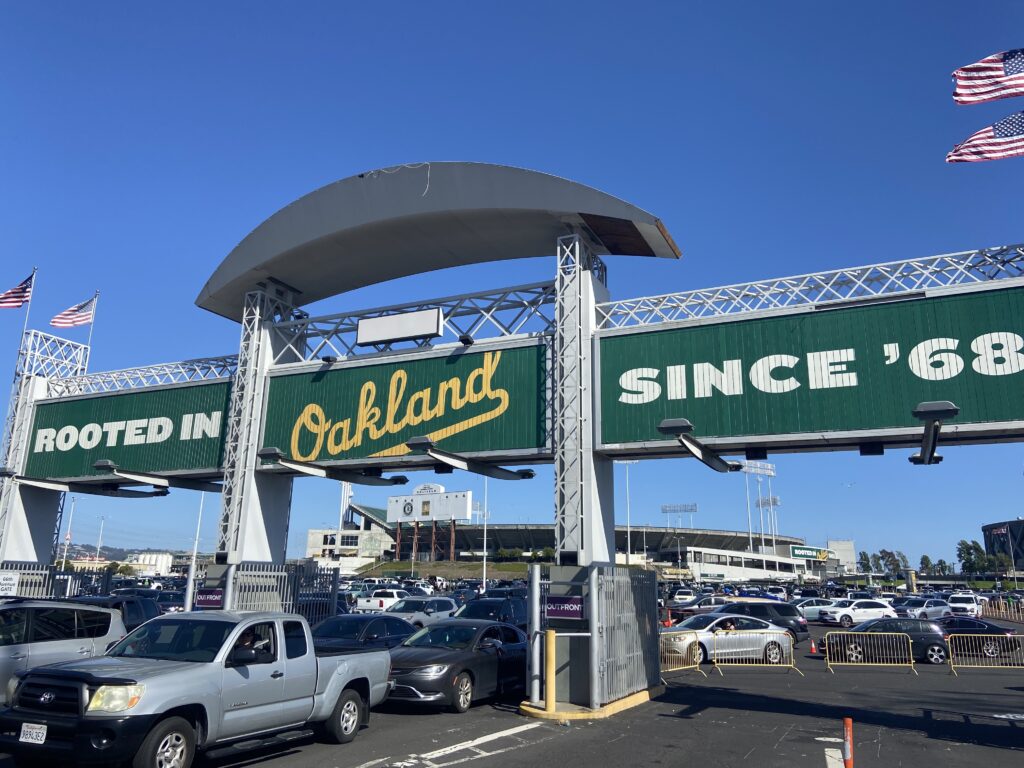

OAKLAND — Few baseball fans will ever have to face the types of conflictions currently facing Oakland Athletics ones.
With the Nevada legislature approving a colossal amount of public funding for the franchise’s desired $1.5 billion stadium in Las Vegas this week, the A’s are one significant step closer to leaving in the dust the ballpark — and the city — they’ve called home for 55 years.
The departure, if approved by MLB owners and finalized, is reportedly likely to take place at the end of the 2024 season, when the team’s stadium lease with the City of Oakland expires.
It means the Phillies might have just played their final game at the venue currently called Oakland-Alameda County Coliseum. And it means that the A’s fans who continue to show up to that ballpark this season are doing so with the knowledge that in less than two years’ time, it might well be reduced to rubble.
“It’s hard. I have an emotional connection to the Coliseum. A lot of us do. And I’m not gonna sit here and claim it’s some great stadium. It’s not,” Eli Toney, who for years has been involved in grassroots efforts to keep the A’s in Oakland, told Phillies Nation on Sunday. “It’s gonna be sad to see it go, not because it’s the best, but because of what it represented for decades of baseball.”
So what’s next? Oakland fans will have an uncomfortable decision facing them if and when the A’s do indeed move, and none of the options at their disposal are particularly appealing.
They can let their fandom follow the team — the team that ran its product into the ground to crater attendance and justify a move while half-heartedly negotiating with a city it arguably used as leverage — to another state.
Or they can simply take the all-too-familiar approach they took only a few short years ago.
“There’s no replacing — you know, when you have a breakup in your heart, you don’t —” started Matt Zahner, who’s been going to A’s games since their second game in Oakland in 1968, before his voice broke. “Unfortunately I’ve been down this road before because I was a Raider fan as a kid. And when they left, basically, I stopped caring about football. I really did. And when this happens, that’s what I’m gonna do … If it happens, I’m gonna be done.”
Done, like — with baseball?
“Yeah. Yeah. And I grew up loving baseball. It was the sport that I loved. It still is. So if indeed they move along, my heart — that part will be broken.”
There’s an option No. 3, for those A’s fans who can’t quite support the franchise any longer but feel like the void can be filled elsewhere.
They can pick a new team and region entirely, or A’s fans can reach just across the bay to San Francisco and shift allegiances to the Giants, who have blocked the A’s from moving to San Jose in the name of territorial rights — part of the reason the club has gotten to this point in the first place.
Rooting for the hometown team is nice, but there might be too much animosity, well-placed as it is, for many fans to settle on that solution.
“[In] no other two-team market is this allowed,” Toney said, noting that the Yankees, Cubs and Dodgers would never be allowed to block the Mets, White Sox and Angels, respectively, from relocating. “Why is it that the Giants are so special? The level of corruption, the level of incompetence involved is astounding. It’s a real tragedy.”
There are some holdouts who remain faithful there’ll be no decision necessary at all — that is, who cling to hope for a path forward in Oakland and refuse to believe in another figment of John Fisher’s imagination until it’s officially underway.
That path forward could mean a sale of the team. It’s a wish shared almost universally by A’s fans these days, a slogan chanted regularly at every home game the past few weeks and a simple one-word command etched on shirts distributed by fan groups at Tuesday’s reverse boycott.
Zahner wore that green “sell” shirt to the A’s-Phillies game on Sunday — as did the daughter of Bill Coleman, a season ticket owner along with his dad for 17 years and one of those aforementioned Oakland hopefuls (or perhaps “skeptic” is a more accurate descriptor).
“Something’s really fishy,” Coleman said, citing the Athletics’ perplexing interest in a tiny nine-acre plot of land for their new stadium and the unviability of Las Vegas as a baseball market as deterrents. “Things don’t add up. I always thought, ‘OK, something’s going to be done here.’ And I still think something’s in the plans, and they won’t move. Hopefully they sell and get an owner that wants to win.”
Asked about the eerie feeling of attending games at a venue whose days might be numbered, Coleman said he wouldn’t let himself think about it “until that shovel goes into the ground.”
If the A’s move to Las Vegas, it’ll take multiple generations for them to rebuild a fan base there. A shovel in the ground doesn’t create one out of nothing.
They may struggle with that. They may ultimately miss the fanbase they left behind in Oakland — one that will neither forgive the betrayal nor forget the decades of history that preceded it.
“Coming here to the Coliseum, this is a second home. I’ve been coming here my whole life and we’ve been bringing our kids here our whole kids’ lives,” Zahner said. “If anybody says ‘Hey, why don’t you just become a fan of this team or a fan of that team,’ it’s not happening. There’s no way.
“My blood is not blue or red or whatever. It’s green and gold … This is the team. It’s my identity.”